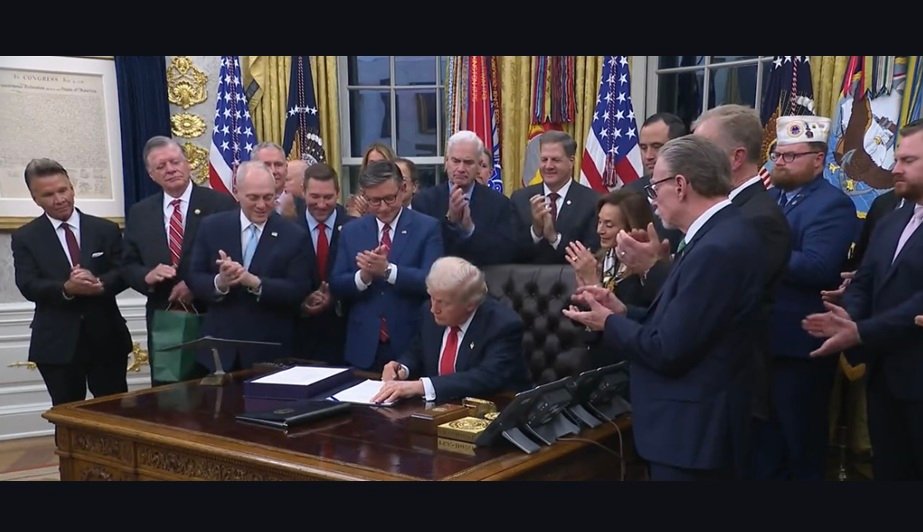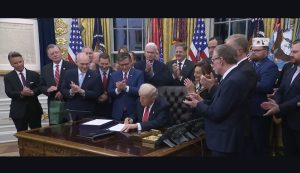
Trump Signs Legislation to End Government Shutdown
Share your love
 -Editorial
-Editorial
The longest government shutdown in U.S. history ended as President Donald Trump signed a bipartisan funding bill on the 43rd day of the closure.
While Trump called the bill a “very big victory,” few lawmakers were fully satisfied. Democrats did not secure their requested health care provisions, and Republicans, despite controlling Congress, faced criticism in polls and recent state and local elections.
“The Democrats tried to extort our country,” President Donald Trump said Wednesday before signing a bipartisan funding bill that ended the 43-day government shutdown.
Trump, speaking in the Oval Office alongside Republican congressional leaders, said, “Republicans never wanted a shutdown. People were hurt so badly.” He added, “We can never let this happen again,” reiterating his call for the Senate to end the filibuster rule that effectively requires 60 votes to pass legislation, including short-term funding measures.
The funding package provides short-term appropriations through January 30 while delivering full-year funding for critical areas including military construction, veterans’ affairs, the legislative branch, and the Department of Agriculture. It also guarantees the continuation of the Supplemental Nutrition Assistance Program (SNAP) through September 2026, ensuring food security for millions of low-income Americans who faced uncertainty during the prolonged shutdown.
This funding gap marked the 21st in U.S. history and the 11th official government shutdown in the modern era — the third during Trump’s presidency. The impasse stemmed from partisan disputes over health care spending, particularly whether to extend Affordable Care Act subsidies and allocate funds for rural health clinics, a top Democratic demand. For more than six weeks, Congress remained deadlocked, leaving hundreds of thousands of federal employees without pay and many essential programs suspended.
Across the nation, the effects of the shutdown rippled through multiple sectors. National parks and museums were shuttered, passport and visa processing slowed dramatically, and the Internal Revenue Service struggled to keep up with pre-filing season demands. Air travel delays became widespread as Transportation Security Administration (TSA) staff shortages worsened, and food assistance programs faced temporary suspension, forcing local governments and nonprofits to fill the gaps.
Republican leaders, however, framed the outcome differently, portraying the agreement as a victory for fiscal restraint. In a joint statement, House Speaker Mike Johnson, Majority Leader Steve Scalise, Whip Tom Emmer, and Conference Chairwoman Lisa McClain said, “The Democrat Shutdown is finally over thanks to House and Senate Republicans who stood firm for responsible governance.” They criticized Democrats for delaying negotiations and “playing politics with working families’ paychecks.”
Despite the partisan sparring, the Senate achieved a rare display of bipartisanship last weekend, voting 60–40 to advance the bill with support from eight Democrats and nearly all Republicans. Senators Jeanne Shaheen (D-N.H.), Maggie Hassan (D-N.H.), and Angus King (I-Maine) played key roles in brokering the final compromise, which was designed to avert deeper economic consequences.
The shutdown’s economic toll was substantial. According to preliminary estimates by the Congressional Budget Office, the 44-day closure cost the U.S. economy more than $18 billion in lost productivity and delayed services, making it the most financially damaging shutdown to date. Thousands of small businesses dependent on federal contracts faced revenue shortfalls, while rural farmers reported stalled payments from USDA programs. The Department of Housing and Urban Development also warned that prolonged funding lapses could have jeopardized rental assistance for nearly 1 million low-income households.
The legislation would retroactively pay roughly 4,000 furloughed federal workers and restore full operations across all agencies. It would also allow for the resumption of public services such as tax processing, agricultural aid programs, and transportation safety oversight.



